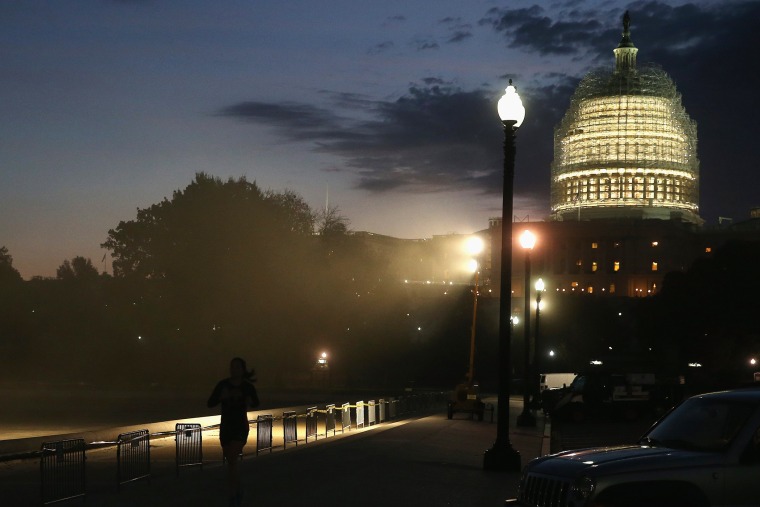By the time a party's candidates get to the "vote for me as a check against the other party's presidential candidate," they're effectively giving up on their own party's national ticket. The Associated Press
reported yesterday that many Republicans have already reached this point.
With polls showing Republican presidential candidate Donald Trump facing a steep path to victory, GOP candidates are increasingly seeking voters' support by saying they will check [Hillary] Clinton's agenda. Republicans hope that a loathing for Clinton will drive voters to the polls who otherwise might stay home because of their aversion to Trump.
Some Republicans aren't exactly being subtle about this message. One of Sen. John McCain's (R) re-election
ads in Arizona tells voters, "If Hillary Clinton is elected president, Arizona will need a senator who will act as a check, not a rubber stamp, for the White House."At a certain level, it's easy to imagine some voters finding this persuasive. If you're skeptical about Clinton, you might see some value in keeping Congress in Republican hands, despite the party's performance in recent years, to keep a Democratic White House from going "too far."But it's important that voters also understand the practical implications of such a strategy: the question is less about the value of "checks," and more about the public's appetite for gridlock.Recent history offers a compelling guide: in 2009 and 2010, President Obama and congressional Democrats were able to accomplish quite a bit, and they would've done even more were it not for Senate Republican filibusters. In 2011, however, Republicans took control of the House, and the federal legislative process nearly ended.In 2015, Republicans claimed majorities in the House and Senate, and progress stopped altogether.Americans who get frustrated by the fact that Congress doesn't seem to get anything done anymore aren't wrong -- since the 2010 midterms, lawmakers have reached a level of inactivity with no modern precedent. This, in turn, creates an awkward pitch for Republican candidates who assume Clinton is going to prevail: "Vote for me," they're effectively arguing, "and I'll deliver more gridlock and congressional ineptitude."Writing in
The Week, Paul Waldman has
a good piece on this dynamic.
Let's think about what that "check" on Clinton might be. If we were in a different era -- or even if we were contemplating a Republican president and a Democratic Congress -- it would mean what people say, that with our senator keeping an eye on things, the president won't get out of control with some highly ideological agenda. He or she will have to stick to practical proposals with wide support. Divided government would slow things down and make for more deliberative legislating, one where compromise is necessary to accomplish anything.But today's Republican Party has a much different idea of what it means to keep a Democratic president in check. As we've seen in the last eight years, they believe that with only the occasional, very rare exception, their job is to stop everything a Democratic president wants to do. They've made it standard practice to filibuster every bill of any consequence whatsoever, and if Barack Obama wants it, they're going to do everything in their power to prevent it from happening. There are no compromises, no working across the aisle -- and everyone who voted for a Republican Congress in 2010 and 2014 knew that's exactly what they'd get. There's no reason to think they'll act any differently under President Hillary Clinton if they maintain a majority in one or both houses.
To be sure, that has some appeal to those voters who want the federal legislative process to break down, as well as those who would prefer inactivity to Clinton's platform.But those who've grown tired of legislators who don't legislate should read the fine print on assurances about "checks" on a Democratic White House.
